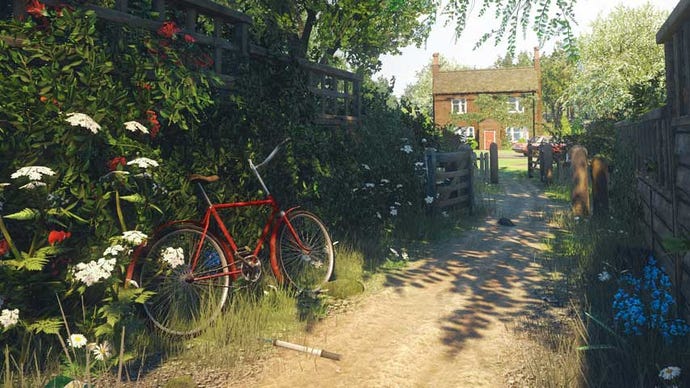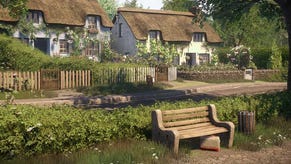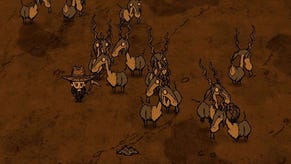Everybody's Gone to the Rapture - very, very slowly
Everybody's Gone to the Rapture is a slow and thoughtful act of narrative excavation, which made Brenna long for an assault rifle and a race car to fire it from.
Okay, fine, let's talk about Everybody's Gone to the Rapture.
I didn't actually mean to talk about Everybody's Gone to the Rapture today, but my PC chucked a tanty so I wasn't able to keep playing Volume ahead of today's embargo. This annoyed me, naturally, but on the other hand it pretty much forced me to stop procrastinating Everybody's Gone to the Rapture and just get on with it.
Spoilers for the rest of the article: I was procrastinating because I didn't enjoy playing it very much. And I swear this isn't just about the run button.
Let's just start off by saying that if you don't like narrative-driven, combat-free games (Gone Home, The Vanishing of Ethan Carter, The Chinese Room's earlier effort Dear Esther) then you won't like Everybody's Gone to the Rapture. Excellent! We have just saved ourselves a great deal of time and angry comments.
On the other hand if you do like this style of game there's not actually any guarantee that you'll enjoy Everybody's Gone to the Rapture, so stick around and let's hash it out - spoiler-free, of course.
For the sake of brevity, and with no derision but great love and appreciation, let's just go ahead and call the whole "narrative-driven combat-free" genre "walking simulator". Everybody's Gone to the Rapture is one of the most polished and beautiful walking simulators ever produced. It is full of gorgeous vistas, and lovely, detailed-filled nooks and crannies. yes, there's quite a lot of asset reuse, but it never feels like copy-paste; it feels like a fairly homogenous 1980's country town, filled what I can only assume are authentic flourishes (50p beer, are you kidding me, 1980's Britain was a paradise).
The area you explore - village, forest, farm, campsite, industrial estate and observatory - is very neatly laid out in such a way that you can see other parts of the map and identify paths leading in and out of the rough gameplay zones. Indeed, the whole borough is helpfully decorated with civic maps, showing where you are and hinting at where the borders of each section may be. Navigation is beautifully funnelled through intersecting and circular roads, lanes, trails, stairs, and gates, all nestled in a rolling landscape of pastoral beauty.
It's all very lovely and atmospheric, helped along by excellent sound design. I don't think any other walking simulator even approaches it. Graphically, it's pushed the boundaries of the genre, that's for sure.
In other ways, wow, it really hasn't. In Everybody's Gone to the Rapture you walk around and collect snippets of story, gradually opening new paths as you do so. Same old same old, right? The main point of differentiation is that instead of text logs you collect audio logs and - well, it's hard to describe. You see glowing outlines of characters, hear them talk, and can follow their movements somewhat. You stay in control during these moments so I don't want to call it cutscenes.
These are pretty cool to watch but they don't really feel more effective or affective than text or audio logs alone would be. Sometime in the last few weeks I saw a tweet that said something along the lines of "why are horror games full of text logs, nobody reads them, why can't they use literally any other kind of narrative tool". Everybody's Gone to the Rapture feels like it's trying to change things up in this regard, but I can't say it's been successful. You can stand and watch and listen, or you can bugger off. In either case, you're passively receiving a story.
Now, there's nothing wrong with games or interactive experiences that have the player passively receive a story - except that I personally am pretty bored of 'em. After playing a bunch of games like this, I no longer feel atmosphere, gorgeous visuals or the ability to point the camera about are that interesting on their own. I want to do something. I found myself wishing Everybody's Gone to the Rapture did use text logs, because I read a lot faster than these people talk.
Division of opinion on Everybody’s Gone to the Rapture will hinge on whether you cared about Wendy’s relationship to Stephen and Kate or whether you just wanted to get on to the bits where everybody dies.
I think for Everybody's Gone to the Rapture's formula to work you have to be really invested in the story, and to a degree, I was. A lot of people won't be. There's an apocalyptic sci-fi tale in there, but it's buried under interlocking layers of human interest. If you are the sort of person who rapidly picks up on and enjoys details of human relationships, you'll probably be pretty interested, if maybe slightly exasperated at how many times the same detail is communicated. If you're not, you may find the non-chronological storytelling a bit difficult to follow, or maybe even just plain boring.
I did like the story. I like people. I have never lived in Britain (yet) but I grew up in country towns and I felt a comfortable sense of familiarity with the characters and their interrelationships. I got involved in their various concerns. I remembered who everyone was. I greatly appreciated the natural-sounding dialogue and the excellent voice acting. (Goodness me, did The Chinese Room get its voice actors together in the same booth and let them see the whole script? This is practically unprecedented in games!)
You might not, and I think a lot of division of opinion on Everybody's Gone to the Rapture will hinge on whether you cared about Wendy's relationship to Stephen and Kate or whether you just wanted to get on to the bits where everybody dies (not a spoiler. You did look at the game's title, right?) and put together the pieces of the sci-fi puzzle.
I think there's probably quite a lot to be said about the story of Everybody's Gone to the Rapture. In the months to come we'll see much cleverer people than I unpacking its themes of life, death, the immortality inherent in human relationships, and the motifs of light and communication. I look forward to having my mind gently blown.
But I myself am not going to do a close reading because I think I'd need to play through again at least once, and I just don't want to. Here's where we get to the complaining bits in earnest: Everybody's Gone to the Rapture is just such a pain to actually play.
The main problem is pretty much that your entire interaction with the world is walking around and looking at things: there's no puzzle solving, except a very mild bit of narrative piecing together happening entirely in your head, and there's very, very little interaction. Everything is firmly stuck down. The game does not really respond to you in any way, as it does in The Stanley Parable, or to a lesser degree Gone Home, and you are entirely reduced to the role of cameraman. There's even a glowing ball of light to follow around from story point to story point, so there's no mystery of progression.
Still, Everybody's Gone to the Rapture would have got away with being a game where you walk and look if the acts of walking and looking were not, in themselves, so much of a chore.
Yes, I mean the painfully slow walking speed. As you hopefully know, Everybody's Gone to the Rapture includes an unadvertised run button. Even at top speed this is still pretty limited, but you are slowed to a crawl in any interior space, and there are loads of instances where running just doesn't work at all and you are forced to pottle along at The Chinese Room's idea of the correct pace to sufficiently take in its landscapes and music, and dwell on story events.
You are forced to pottle along at The Chinese Room's idea of the correct pace. I felt like I was being strong-armed, like my attention was being forced. "Look at how pretty everything is," the game seemed to be saying. "Feel the emotions appropriate to what you have witnessed."
The landscapes, music and story events are, as discussed, pretty good - but I don't need 45 seconds of forced walking along a dark lane to appreciate 'em. I felt like I was being strong-armed, like my attention was being forced. "Look at how pretty everything is," the game seemed to be saying. "Feel the emotions appropriate to what you have witnessed." Out of rebellion, I often stopped completely and waited for the music to give up and die away, imagining my character having a cigarette and checking Twitter while they leaned against a tree. Get off your feet for a bit, kid; all this walking must have worn you out.
This felt like the only creative or interactive act I was offered. For I think the third time I will say that it is absolutely fine for games to exist that offer very little responsiveness to the player, although products like The Stanley Parable, which really play up to the strengths of the interactive medium and push walking simulators forward, make me wonder why other developers don't follow suit.
Painful exploration is a dealbreaker in a game where exploration is your only activity. Everybody's Gone to the Rapture offers you a glowing ball to follow about, or the freedom to explore where and what you choose, and doesn't explain itself, at all. That would be fine but because I play a lot of video games (on my $400 machine for playing video games, to which Everybody's Gone to the Rapture is currently exclusive, and therefore must expect an audience composed of similar people), my approach was to try and see and do everything possible. I have no idea if I succeeded because of that same lack of signposting.
If you go off-course from the floaty ball, are the story points you see optional, or are we just getting to them out of order? Is it necessary to view every story point to unlock the ending of each of the six arcs, paths to the next character arc, and the game in general? Did I, on my journey, see and do everything, or have a partial experience of the content on offer?
I don't know! I don't know the answers to these questions, because the game gave me absolutely zero feedback. As I was playing I agonised over my choices - do I keep going this way or turn back? Is this the right way? Will I miss something if follow the ball, or will I miss something if I don't? I was in agony, because exploring these options took forever and ever and ever at the game's painfully slow jog, and every wrong turning meant 30 seconds of staring at an empty road as I stumbled back. 30 seconds, otherwise known as an eternity.
Just to put a cherry on it, the review build I was sent had abysmal loading times, so every time I quit in disgust I had to wait to get back in. Clearly, I am too impatient for Everybody's Gone to the Rapture. Maybe the lauded atmosphere and storytelling will be enough for you, to outweigh its slow pace and minimal interaction. Maybe you're supposed to be stoned when you play it.
Personally, I'm just happy to have put it to bed. This is not the future of interactive narrative; this is its past.
Everybody's Gone to the Rapture is out now on PS4.






















.png?width=291&height=164&fit=crop&quality=80&format=jpg&auto=webp)